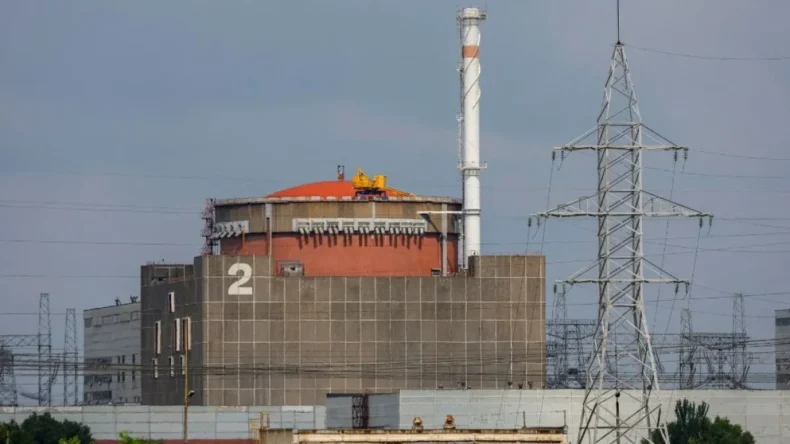International Nuclear Watchdog Urges Increased Access to Ukrainian Nuclear Plant Amid Sabotage Concerns
The International Atomic Energy Agency (IAEA), the United Nations’ nuclear watchdog, has called for enhanced access to Ukraine’s Zaporizhzhia nuclear plant, currently under Russian control. The move comes as both Moscow and Kyiv accuse each other of plotting acts of sabotage at Europe’s largest nuclear power facility.
Table of Contents
In a statement on Wednesday, IAEA Director General Rafael Grossi emphasized the need for increased access to the Zaporizhzhia plant to ensure the absence of explosives or mines on the site. Heightened military tension and activities in the region have raised concerns, prompting the agency to seek verification on the ground.
Although previous inspections by IAEA staff did not reveal any visible signs of mines or explosives, further access is deemed essential to shed light on the current situation amidst circulating unconfirmed allegations and counter-allegations, according to Grossi. Specifically, the IAEA chief highlighted the importance of accessing the rooftops of reactor units 3 and 4, as well as parts of the turbine halls and cooling system.
On Wednesday, Ukraine and Russia traded accusations of planning attacks on the Zaporizhzhia plant. However, neither side presented evidence to substantiate their claims of an immediate threat to the facility. Ukrainian President Volodymyr Zelenskyy stated on Tuesday that Russian forces had purportedly placed objects resembling explosives on top of certain power units at the plant to fabricate an external attack scenario. The objective, Zelenskyy asserted, was to create an illusion of shelling from Ukraine. The Ukrainian Armed Forces’ general staff echoed these claims, citing intelligence reports.
The call for increased access to the Zaporizhzhia nuclear plant by the IAEA underscores the importance of maintaining transparency and ensuring the safety of critical nuclear installations in the face of escalating tensions. As the situation unfolds, further investigation and cooperation between international agencies and involved parties will be crucial to accurately assess the potential risks and avert any potential disaster.
Heightened Tensions: Accusations Fly Over Potential Threats to Ukraine Nuclear Plant
In an escalating war of words, Ukrainian President Volodymyr Zelenskyy has accused Russia of planning to stage an incident at the Zaporizhzhia nuclear plant, reminiscent of the recent destruction of the Nova Kakhovka dam. Zelenskyy asserted that the nuclear facility had been mined by Russian forces, emphasizing the need to prevent any disastrous scenarios.
Russian authorities, on the other hand, have alleged that Kyiv is plotting an act of sabotage at Zaporizhzhia. Kremlin spokesman Dmitry Peskov expressed concerns about the high threat of sabotage from the Ukrainian regime, emphasizing the potential catastrophic consequences. Russia claims to be taking all necessary measures to counter this alleged Ukrainian threat.
Renat Karchaa, an adviser to Russia’s state nuclear company Rosenergoatom, which controls the Zaporizhzhia plant, dismissed Zelenskyy’s claims as baseless. He refuted the notion that Moscow would have any need for explosives at the site, suggesting that these allegations were aimed at maintaining tension. Karchaa previously made televised remarks accusing Ukraine’s military of planning a nighttime strike on the plant using ammunition containing nuclear waste, but no such attack occurred.
As accusations continue to fly between Ukraine and Russia regarding potential threats to the Zaporizhzhia nuclear plant, tensions in the region remain high. Both sides have exchanged allegations without providing concrete evidence to support their claims. The international community will closely monitor the situation, emphasizing the importance of defusing tensions and ensuring the safety and security of critical nuclear installations. Cooperation between all parties involved will be vital to prevent any potential disasters and maintain regional stability.
Rising Concerns of Deliberate Provocations Surrounding Ukraine’s Zaporizhzhia Nuclear Plant
The ongoing conflict between Ukraine and Russia has intensified fears regarding the safety of the Zaporizhzhia nuclear plant. Due to frequent shelling in the vicinity, regular power outages have forced the plant’s six reactors to remain shut down since September as a precautionary measure.
The International Atomic Energy Agency (IAEA) has repeatedly expressed apprehension over the potential for a radiation catastrophe similar to the 1986 Chernobyl disaster. In recent weeks, Ukraine has raised concerns that Moscow may orchestrate a deliberate leak at the Zaporizhzhia plant to undermine Kyiv’s counteroffensive in the surrounding Zaporizhia region.
Al Jazeera correspondent Rob McBride reports that Ukraine has warned of a possible “false flag” operation by Russia. This involves setting off explosives on the plant’s rooftop to create the illusion of a Ukrainian attack. Conversely, the Kremlin has accused Kyiv of planning to target the nuclear facility using long-range precision weapons. Both sides have drawn parallels between the situation at Zaporizhzhia and the destruction of the Nova Kakhovka dam, each blaming the other.
President Volodymyr Zelenskyy asserts that the international community’s failure to hold Russia accountable for the dam’s destruction has emboldened Moscow to potentially target the nuclear plant. The Ukrainian health ministry has cautioned residents in the plant’s vicinity to be prepared for evacuation in the event of a major radiation leak.
Ukrainian emergency workers recently conducted a drill to prepare for a possible release of radiation from the plant. In the event of a nuclear disaster, approximately 300,000 people residing near the facility would be evacuated according to the country’s emergency services. Officials assure that the shutdown reactors are protected by robust concrete containment domes, designed to withstand barrages.
In response to the heightened tensions, the Ukrainian health ministry has released guidelines for residents in case of an emergency, advising them to assemble emergency bags containing essentials such as face masks and food, properly sealed in plastic. The ministry emphasizes the importance of staying indoors or evacuating promptly if a radiation emergency is officially announced, while urging residents to remain informed and follow instructions.
As concerns grow over potential provocations at the Zaporizhzhia nuclear plant, ensuring the safety and well-being of nearby communities remains a top priority. Continued vigilance, preparedness, and adherence to official guidelines are crucial during these uncertain times.













